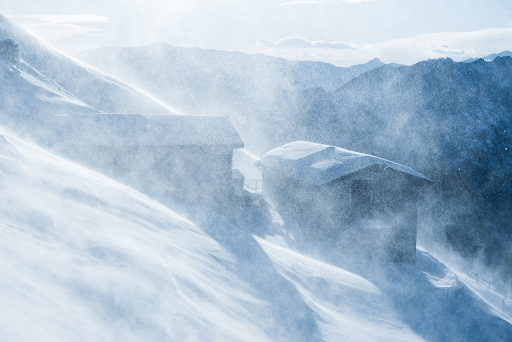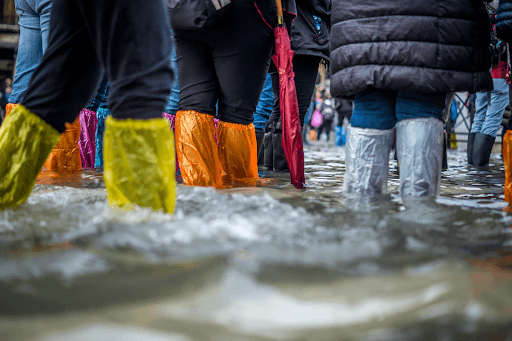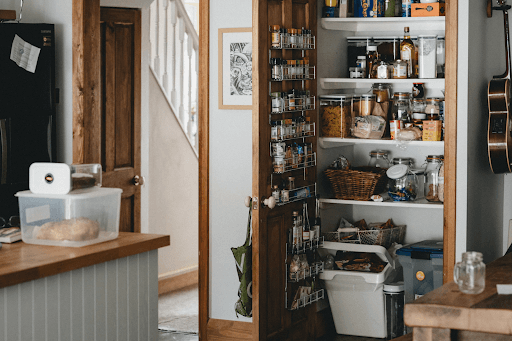Regardless of where you live, a natural disaster can happen at any moment. Though heavy snowfall and floods may be anticipated at certain times in the year, it is important to be prepared year-round for unexpected natural events. With these tips, you’ll be prepared for any natural disaster, whether you see it coming or not.

Battling Blizzards
Blizzards are most likely to occur during winter in Canada, from December through February. However, a blizzard could pop up anytime between October and May and is more likely to happen in spring than in fall.
Make sure you have the proper equipment to ward off snow from your home and car. You know the drill — as snow piles up, the only way out of your home is to dig your way out. Having a shovel handy in winter is a necessity if you want to leave your house. If you have a snow blower, make sure it’s working properly and is filled with gas or has a fully charged battery.
If you attempt to leave the house during a snowstorm, your car needs to be weatherized. Switch out the all-weather tires for winter tires, have tire chains ready, and maintain your vehicle’s tire pressure.
Keep extra blankets and warm clothes handy in case you lose power. You can also line your doors and windows with towels or blankets to further insulate your home.

Fighting Floods
Floods are the most common, and the most costly, natural disaster in Canada. They may strike at any time of the year and are most often caused by rapidly melting snow or heavy rainfall.
If you ever find yourself at home amid a flood, don’t drink the tap water. Tap water can become contaminated during floods and is no longer safe. You should also avoid standing water and floodwater outside. Floodwater can carry disease, be contaminated with sewage, or conceal dangerous objects.
General Safety Suggestions
Though floods and blizzards are to be expected, it’s best practice to be prepared for any natural disaster. Here are some tips to keep you safe in your home, no matter the issue.
Secure Important Documents
Passports, social security cards, and other important documents run the risk of getting destroyed during natural disasters. Make sure they’re properly stored in a safe that can protect them from water damage and fire. If you’ve yet to invest in a safe, these guidelines will help you purchase your first one.

Stock Up on Water and Nonperishable Food
You’ll want to prepare supplies to last at least a week. Load up on canned foods – the kind that can be eaten cold if you don’t have electricity. Nuts and nut butter, granola bars, and dried fruits are also ideal to keep on hand. Also, be sure to keep plenty of extra water on hand. As we mentioned, tap water can be unsafe to drink during floods, and water lines are often turned off when temperatures are below freezing.
Stay Charged and Fueled
Don’t let your tank run on empty. Keep your car fueled up, especially when anticipating a natural disaster like a snowstorm. If the roads are flooded or icy, gas stations may run out of gas because it’s harder for large fuel trucks to travel safely. Keep your phone fully charged in case your electricity goes out and you need it for an emergency.
Have a First-Aid Kit Ready
Having a first-aid kit is important, whether you’re preparing for a natural disaster or not. First aid kits can be purchased for as little as $20, and the added protection is worth the investment. Make sure your medicine cabinet has any other essentials you may need. And don’t forget to refill any vital prescription medications!
Keep Extra Batteries
Keep extra batteries on hand so you’re not left in the dark if your flashlights die. You’ll also want to have several flashlights in your home, preferably spread out throughout the house so you can access them from any room. Portable phone chargers (that are fully charged) are also a great thing to have – you never know how long a power outage may last.
Don’t wait until the forecast warns you about a natural event coming your way. Prepare for any natural disaster to come, by following these guidelines. For more tips on keeping your home secure this winter, head over to our website!


